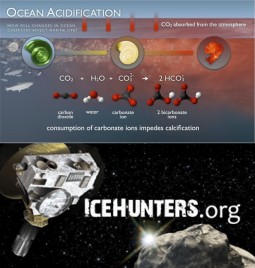
Feature #1: Many problems plague the oceans and the fish and other species that inhabit them: overfishing, pollution, and much more. But perhaps the greatest threat to sea life – and possibly to humans – is ocean acidification. That’s when the chemistry of the ocean changes and causes seawater to become more acidic because the ocean is absorbing carbon dioxide from the atmosphere. This increase in ocean acidity makes it difficult for many plants and animals in the ocean to make or maintain their shells or skeletons. The head of the National Oceanic and Atmospheric Administration (NOAA), Jane Lubchenco, recently said that the ocean is becoming more acidic at rates not seen for at least 20 million years, and that’s due mostly to increases in CO2 in the atmosphere. The threat is so grave that NOAA recently created a distinct Ocean Acidification Program. In May, Dr. Libby Jewett was appointed the first director of the program. We talk with Dr. Jewett find out more about the problem and what she aims to do about it.
Feature #2: Some sciences have a tradition of fruitful interactions between professional researchers and amateurs, and this has been made even more accessible with data being able to be shared over the internet across the world. Dr. Pamela Gay, an Astronomer at Southern Illinois University, Edwardsville, is the architect and participant in many such collaborations. In addition to her teaching and research, she does extensive public outreach to share the excitement of astronomy (such as her podcast AstronomyCast.com) and even finds ways to let anyone with an internet connection make new scientific discoveries and find new worlds that will be visited by spacecraft (IceHunters.org). We talk with Dr. Gay about the Zooniverse and her hunt for of icy objects in the outer solar system.
Hosts: Susan Moran and Joel Parker
Producer: Joel Parker
Engineer: Tom McKinnon
Listen to the show:
Podcast: Play in new window | Download (Duration: 24:39 — 29.4MB)
Subscribe: RSS



